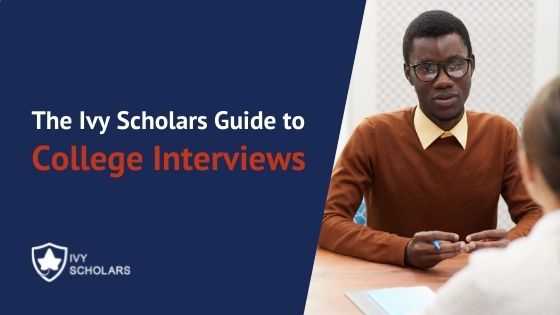Many colleges offer optional interviews as part of their admissions process. These are never the most important part of an admissions decision, and often serve merely to confirm what admissions officers already expect about an applicant. For some students, however, they can be an integral part of their college admissions process.
So how do you know if you should do an interview? What kinds of questions will colleges ask? Most importantly, how should you prepare for an interview? We’ll answer all of these questions in this article, and guide you through the college interview process. Let’s jump in!
Who Should do a College Interview?
If a school is your first choice, we recommend setting up an interview, regardless of other considerations. For one, an interview is a good way to demonstrate interest in a first choice school. It lets the school know you’re serious about them, and that you’ve gone the extra mile to learn about them, and to let them learn about you.
The interview will also let you learn more about your first choice school. Most college interviews are run by alumni of the school, so you will be able to get your questions answered by a first hand source. While some of their information may be a bit out of date, this is a good place to learn about campus climate, the workload, or even what the food on campus is like. A good interview should be a give and take of information, and you will learn as much about the school as they learn about you.
Generally, however, you should check to see how much a school values interviews before scheduling one. This is one of the pieces of information we include in our fact sheets, or you can simply Google the name of the school + interviews to find their views on the subject. If you are applying to a lot of schools, we recommend not doing interviews for most of them. Only do interviews for your top choice schools, or if the college indicates that they value interviews a lot in the admissions process.
How do College Interviews Work?
Interviews are conducted by representatives of the school, including current students, professors, admissions staff, and alumni. Usually interviews last no longer than an hour, as they generally consist of a casual conversation. You should present the best version of yourself; be genuine, but remember to remain polite and civilized, especially when discussing political or otherwise controversial topics.
Even if you are not explicitly told to bring a resume, it is a good idea to bring one along anyway, as it makes it easier for the interviewer to refer to your experiences and ask you to reflect on them. Some schools allow the interview to take place via internet chat or over the phone. Online and phone interviews have become increasingly common over the past year, though the future of this practice is uncertain.
Remember to show up on time or a little early to an interview. Don’t show up too early; that can be as awkward as showing up late. Five minutes early is a safe bet if you are worried. You should dress business casual; not all the way dressed up, but not too casual either. You want to make a good first impression.
What Will Colleges Ask in an Interview?
While there are many possible questions for interviewers to ask here are the three most common:
- Why are you interested in this school?
- What are you interested in studying?
- Tell me about yourself.
It’s no coincidence that the first two of these parallel two of the most common supplemental essay topics. These are the most obvious questions to ask a future college student and reveal the most about their plans. We’ll now give you advice for answering each.
Why this school?
You don’t need to know everything about a college before interviewing with them, but you should have a sense of what specifically about that school is appealing to you. If you’ve had to write a “Why Us” essay about the school in question, you should be well prepared to answer this question, so merely spend some time reviewing that essay and your notes for it.
If, on the other hand, the school did not ask for a “Why Us” essay, then you can prepare for this question the same way you write one of those essays: by researching the school to find out what, specifically, you like about it. The more specific your answer, the better.
Finally avoid pointless flattery. The interviewer presumably knows the college is great, that’s why they’re doing interviews for them. This is one of the few places where flattery will get you nowhere.
What major?
Colleges like students who are passionate about knowledge and learning, so don’t be scared to geek out a little if your interviewer asks about your academic interests. This is a good way to demonstrate your intellectual vitality to your interviewer, and show your innate passions.
This is true even if you are undecided about what you want to major in. Spending some time talking to your interviewer about their own major, and courses they took in subjects that interest you is also a good way to explore your academic interests and potential majors in more depth.
Talking About Yourself
The most important thing to do when talking about yourself is to provide concrete examples of your accomplishments — without making it seem like you’re bragging. You should be modest, but overcome any shyness and aim to come across as genuine and outgoing.
If you’re wondering how to apply this, there are plenty of ways that allow the interviewer to get to know you through your accomplishments. These should circle back to your interests and how they come into play in your day-to-day life.
For example, when you speak about one of your accomplishments, explain the significance that it has had in helping you define your career goals, and if your desired career is one that you’re passionate about (which hopefully you are), your eyes should sparkle as you speak. Avoid twirling your hair or signaling that you’re nervous.
While you should keep the interview light (you don’t want to overstep boundaries or get TOO personal, after all), you should talk about things that have added depth and meaning to your life today.
Questions to Ask Your College Interviewer
At the end of an interview (or perhaps earlier), your interviewer will ask if you have any questions for them. You should have a few! What to ask can be tricky for some students, so we’ll go over some good questions to ask, or topics to cover. In general though, you want to ask questions to find information that you wouldn’t be able to find on the school’s website.
Here are some topics we recommend asking about:
- School culture. While you can learn a lot online, asking your interviewer about their experience with school culture can give new insights. You should be specific with your question, focusing on whatever aspects of culture are most important to you. Popular topics are work/life balance, the party scene, extracurriculars, how collaborative the school is, what dorms are like, what the food is like, and how the surrounding neighborhood is.
- Courses, either core requirements or in your major. Depending on your interviewer, they may not have been at the school in a while, but they may still have some insight into what classes are like at the college, and what academic expectations are.
- Weather. Especially if you are a student from the South interviewing at a more northern school, asking about how winter is can be a good way to prepare for what college will expose you to.
- Their own experiences at the school for alumni interviewers. This can relate to the above points, or to other aspects of life at a school you are curious about. Alumni often love talking about their time at a school; they have volunteered to be alumni interviewers because of their connection to it. You should have specific questions, but getting an interviewer talking about their own time at school can give you a lot of information.
Here are some topics we recommend avoiding:
- Specific admissions questions. Alumni won’t know, and asking them about their applications will at best give you out-of-date information. You can ask admissions officers these questions, but they won’t be able to give you prescriptive advice.
- Questions about other schools. You are there to interview for one school, so your focus should remain on it.
How to Prepare For a College Interview
We have found that the best way to prepare for something is to do that exact thing in a lower stakes environment. Thus, in addition to preparing to answer the questions above, you should practice your answers in a conversational environment. Some schools will have practice interviews scheduled with guidance counselors, and we recommend you sign up for these if they are available.
You can do this with your friends as well; taking turns interviewing each other. Brainstorm questions you will ask about the school, and determine what you should say when asked about your hobbies, favorite classes, or intended major. While this will not feel as “official” as practicing with a guidance counselor, that does not mean its worthless. Indeed, if you are interviewed by a current student, they likely won’t be much older than you are now.
Finally, if you are using a tutoring service, then you should ask your tutor or mentor for a practice interview. This is one of the things we do at Ivy Scholars to help our students with their college applications. If you want to learn more about how we can help you, schedule a free consultation today. We’re always happy to hear from you.
Final Thoughts
An interview often feels incredibly intimidating; after all, this is a real adult, with real responsibilities, and what you say to them can directly impact your chances of getting into college. Therefore, the most important piece of advice we have is to take a moment and breathe. Your interviewers want to help you succeed, and most are doing interviews voluntarily, especially student and alumni interviews. They are enthusiastic about their school, and they want to find students who share their passion.
Thus to succeed in your interview you just need to be the best version of yourself. If you relax, practice, and remember to breathe, you will find conversation flowing naturally, and the interview will go well. We hope that this article will help you reach that state of calm, and wish you luck with your own eventual interviews!








